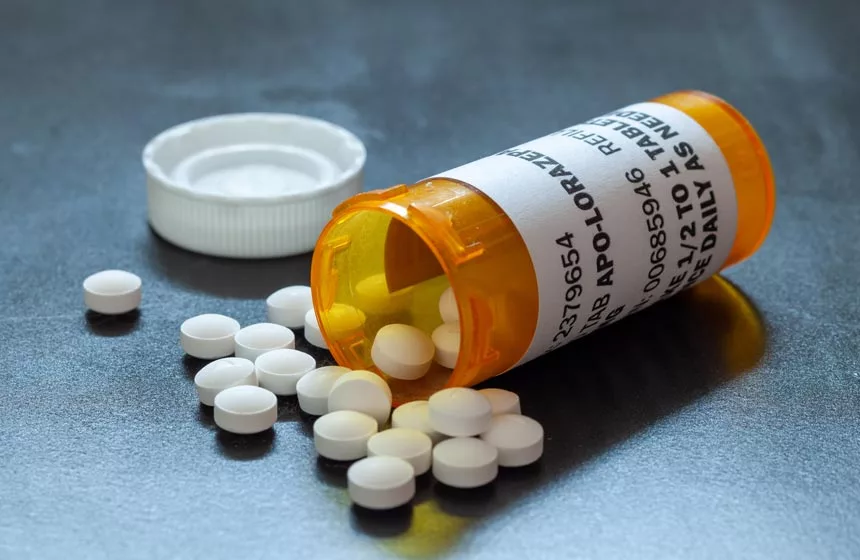What is Ativan?
Table of Contents
- What is Ativan?
- How Does Ativan Work?
- How Long Does It Take To Become Addicted To Ativan?
- What are the Ativan Side Effects?
- What are the Signs of Ativan Addiction?
- Ativan Addiction Withdrawal
- Can You Overdose on Ativan?
- Mixing Ativan With Other Drugs
- The Relationship Between Substance Abuse and Mental Health
- Ativan Addiction Treatment Options
- Find Ativan Treatment Near Me Now!
- Medically Reviewed By
Ativan (Lorazepam) is a medication that is generally prescribed to treat a variety of mental conditions, including anxiety disorder – a mental health disorder involving extreme fear or worry strong enough to interfere with one’s daily life. Ativan addiction occurs when dependence on the drug results in feeling anxiousness and even panic without increasing amounts.
Currently considered a Schedule IV controlled substance by the Drug Enforcement Administration (DEA), Ativan belongs to a drug class called benzodiazepines, which act on the brain and central nervous system in order to produce a calming effect.
As is usually the case with several other benzodiazepines, while Ativan can aid in treating many conditions when used as directed, its addictive nature also makes it highly prone to abuse.
Keep reading to find out more about Ativan dependence and how to get forms of effective treatment!
How Does Ativan Work?
Ativan has a rapid effect on a person’s central nervous system, as it increases gamma-aminobutyric acid (GABA) levels in the brain. This chemical acts as a calming agent within the central nervous system, producing a feeling of tranquility within the mind and body.
This is why prescription drugs like Ativan are commonly used to treat anxiety disorders and other mental disorders, such as general anxiety or even manic bipolar disorder. However, this calming factor is also what makes it such a highly addictive drug.
Taking Ativan will also slow activity within the brain and nerve cells, which can directly affect a person’s physical functions and responses. This can also stop painful muscle spasms and help prevent serious seizures, so long as it is being used correctly.
How Long Does It Take To Become Addicted To Ativan?
There is currently no clearly defined period in which one forms an addiction to Ativan. Generally, however, a person’s likelihood of forming a dependency increases when the drug is used for longer than the prescribed amount of time, or in higher doses than are recommended.
As discussed, Ativan is a highly addictive substance, with its effects becoming gradually reduced over time as users develop a tolerance to the drug. This means that, eventually, it will be necessary for an individual to increase their dosage in order to achieve its usual calming effect.
However, as their dosage increases, so do the risks that this drug poses to its users. The more Ativan they take, and the more regularly they take it, the more likely they will be to form an addiction to this substance; one that will, unfortunately, likely have serious health consequences.
Furthermore, an addiction to benzodiazepines can also put individuals at an increased risk of abusing other substances. According to the Diagnostic and Statistical Manual of Mental Disorders (DSM-5), Ativan addiction is currently ranked as a mild form of sedative use disorder.
Over time, however, this mild form of addiction can become increasingly more likely to produce more intense forms, with the abuse of Z-drugs (e.g., Ambien and Lunesta) being the most severe type of sedative abuse.
What are the Ativan Side Effects?
Taking Ativan may cause a number of negative side effects, which can vary in nature depending on several factors. This may include a person’s physical and mental health, age, genetics, and whether or not they abuse Ativan in combination with other drugs.
Common Side Effects:
Some of the more common side effects of Ativan use, while uncomfortable, may not present an immediate need for medical attention. These may include:
- Increased drowsiness
- Feeling dizzy
- Loss of coordination
- Frequent headaches
- Nausea and vomiting
- Blurry vision
- Changes in sexual interest or ability
- Constipation
- Heartburn
- Changes in appetite
Uncommon But Serious Side Effects:
Individuals who regularly abuse benzodiazepines like Ativan may also have an increased risk of experiencing more severe side effects. While these are less common, they are more likely to occur with extended use, or when using more Ativan than prescribed or needed.
Some of the more serious side effects that may occur when taking Ativan include:
- Mental/mood changes (such as hallucinations, depression, or suicidal thoughts)
- Slurred speech or difficulty speaking
- Unusual weakness
- Trouble walking
- Memory problems
- Signs of infection
- Seizures
- Jaundice (yellowing of the eyes and skin)
If you or a loved one is experiencing any of the symptoms listed above, or if other common side effects are persisting or worsening, it is important to seek out immediate medical assistance.
What are the Signs of Ativan Addiction?
Abusing benzodiazepines like Ativan can present numerous signs of addiction. One of the most common tells of this addiction is if someone is devoting increased amounts of time and energy to obtaining and consuming Ativan.
This behavior will likely have various negative impacts not just on their physical health, but on their everyday lives. These include an increase in work-related issues, as well as breakdowns within personal relationships, or decreased interest in previously enjoyable activities.
Of course, there are various other warning signs of this form of substance abuse that can also serve as a good indication that you or a loved one should start seeking out professional addiction treatment options.
Additional Signs of Ativan Abuse
Some of the more specific signs of someone who is misusing Ativan will include desperate or sneaky attempts to acquire and use this substance. These may include:
- Using without an immediate need or outside of a person’s prescription guidelines for Ativan
- Feigning symptoms in order to get an Ativan prescription
- Sourcing Ativan from those who already have prescriptions for this drug
- Visiting multiple physicians, or “doctor shopping,” to get several different Ativan prescriptions, which ultimately increases their supply
Indicators of Prescription Drug Abuse
Most cases of Ativan misuse occur in people who have a prescription for this drug. In these circumstances, their substance use will have more specific warning signs of abuse, including:
- Prescription bottles are evident in a person’s environment, particularly if there are multiple empty bottles present
- Multiple prescription bottles with overlapping months, indicate several separate prescriptions, as doctors prescribe Ativan only once a month, usually for no longer than four months
- Filling medications at different pharmacies in order to avoid being detected for having multiple different Ativan prescriptions
There are also identifiable physical signs of Ativan addiction. In many cases, the side effects of taking high doses of benzodiazepines can be particularly helpful for identifying someone’s abuse of this drug.
Physical Signs of Ativan Addiction:
Aside from the behavioral and environmental signs of Ativan addiction, there are also several noticeable physical side effects that can indicate if someone is partaking in benzodiazepine abuse, including:
- Increased drowsiness
- Poor decision-making abilities
- Blurred vision
- Difficulty breathing
- Confusion
- Lack of coordination
- Dizziness
- Coma
- Weakness
- Cessation of breathing, leading to death
Symptoms of Chronic Ativan Abuse
Not all abusers consume a high dose of the drug; rather, they take heavy doses over an extended period of time. This behavior indicates chronic abuse. If a loved one is partaking in chronic Ativan abuse, they will likely present several physical symptoms, including:
- Anxiety
- Headaches
- Insomnia
- Weakness
- Anorexia
- Tremors
Ativan Addiction Withdrawal
Ativan dependence can present itself as both a physical and psychological dependence, making it a drug that is particularly difficult to quit. Because of this, significantly reducing the dosage of the sedative or ceasing to take it entirely will often induce withdrawal symptoms.
Withdrawal from Ativan can result in a number of uncomfortable side effects, including hallucinations, sudden numbness, and signs of the flu. These symptoms can be quite severe, particularly for those with a significant physical dependence on this substance.
Ativan Withdrawal Symptoms:
When attempting to stop using Ativan or other benzodiazepines without professional help, Ativan abusers may be putting themselves at risk of significant physical and emotional discomfort.
Individuals may experience withdrawal symptoms that be both physical and psychological in nature, including:
- Anxiety
- Depression
- Panic attacks
- Insomnia
- Depersonalization
- Hallucinations and delirium
- Derealization
- Seizures
Because benzodiazepines are one of three drugs that can be lethal in withdrawal, it is extremely important to avoid rushing the process. Suddenly stopping the drug is inadvisable and may lead to complications more severe than those listed above.
For those going through Ativan withdrawal, they are strongly recommended to participate in a medically supervised detox program in order to ensure their safety while being weaned off of their substance use.
Can You Overdose on Ativan?
As a highly potent drug, it is particularly easy to accidentally overdose on Ativan. These overdoses typically occur when the drug is combined with other substances. Alcohol abuse, for example, is a common co-occurrence with Ativan addiction.
Common signs of Ativan overdose include:
- Slurred speech
- Disorientation
- Muscle weakness
- Slow breathing
- Loss of coordination
- Lethargy
- Cognitive impairment
- Coma
In some cases, an overdose may have fatal consequences. Because of the severe nature of Ativan overdoses, it is important to know and be able to recognize their signs, as this could potentially save your or someone else’s life.
Mixing Ativan With Other Drugs
Ativan is often used with other drugs in order to enhance its therapeutic effects. Alcohol stands out as the most popular substance often combined with this drug, as this pairing can increase central nervous system depression, as well as the sedative effects of Ativan.
However, due to the high potency of this medication, this can result in over-sedation of the user, which may lead to unconsciousness, coma, or even death. In addition to this, combining benzodiazepines with other drugs heightens the risk of overdose.
Ativan is also commonly paired with other forms of drug abuse, including cocaine, methadone, and amphetamines, and may even be used as a popular supplement to opioids.
The Relationship Between Substance Abuse and Mental Health
According to the Substance Abuse and Mental Health Services Administration (SAMSHA), it is quite common for those with a substance use disorder to have a co-occurring mental illness, as well.
This is because many people will turn to substance abuse to self-medicate the negative thoughts and feelings their mental health condition can cause. This, however, is rarely ever effective, and only offers temporary relief to a long-term problem.
In many cases, individuals who struggle with Ativan addiction often suffer from an associated mental health disorder. This is because this drug is often used to treat mental health disorders and other behavioral health conditions.
While the emotional relief provided by this drug can certainly be useful, it is also a part of what makes Ativan addictive. This, unfortunately, can cause the user to begin abusing Ativan; a habit that may only make their mental state continue to deteriorate over time.
It is important for people who suffer from a dual diagnosis to seek out addiction treatment services that can treat both issues simultaneously in order for them to successfully achieve and maintain sobriety.
Ativan Addiction Treatment Options
There are several addiction treatment options that someone struggling with Ativan abuse will benefit from. This will most likely include medical detox programs or staying at an inpatient treatment center.
For those who may not be able to afford or accommodate the time commitment, these treatment services will require, however, participating in an outpatient rehab program can also be particularly beneficial.
Of course, most treatment options will accept forms of insurance for those who are unwilling or unable to pay out-of-pocket. This includes most major insurance providers, although the level of coverage a person may receive will depend on their specific policy.
Speaking with your healthcare provider may be a good idea when seeking professional medical advice on what addiction treatment options may be best for you.
Medical Detox
Whether struggling with a psychological dependence or a physical dependence on Ativan, or even both, seeking out a medically supervised detox program is strongly recommended. This is because certain forms of drug abuse can have particularly intense withdrawal periods.
In particular, opioid and benzodiazepine withdrawal, as well as alcohol withdrawal, can be quite severe, and may even produce life-threatening side effects if not properly managed. That is why detox programs can be extremely helpful for individuals struggling with these addictions.
During the detox treatment process, individuals will be gradually weaned off of Ativan in a safe and controlled environment, while being constantly monitored by licensed medical professionals. These programs may also include dietary planning and nutritional counseling services.
Furthermore, individuals may be given addiction medicine to help manage or prevent more intense withdrawal symptoms, as well as help decrease their risk of relapse.
Inpatient Treatment
For those with a more severe Ativan addiction, treatment at an inpatient rehab center will likely be their best option. These treatment centers, like detox programs, prioritize providing clients with a controlled and secure recovery environment.
Furthermore, inpatient treatment will usually facilitate regular supervision for recovering individuals, as well as constant access to addiction treatment tools and resources throughout the duration of their stay.
These programs may also offer additional services, such as individual, group, or even family therapy and counseling sessions. In some cases, detox may be incorporated into an inpatient treatment program to help individuals safely withdraw from Ativan.
Outpatient Treatment
For individuals with an Ativan addiction worried about the time and money required by more in-depth treatment methods, choosing to overcome their substance use with outpatient treatment options may be preferable.
The treatment overview for outpatient services will usually include participating in sober support groups, relapse prevention programs, and various therapeutic treatment options.
According to the National Institute on Drug Abuse (NIDA), those struggling with substance use disorders should incorporate various addiction recovery approaches and services into their treatment plan, rather than only participating in a singular option.
Find Ativan Treatment Near Me Now!
If you or a loved one is struggling with Ativan addiction, this can be an incredibly difficult and isolating thing to deal with. However, it is important to know that you are not alone, and help IS available.
The Find Addiction Rehabs hotline is available 24/7 to connect you with addiction treatment services and recovery resources anytime you need them. Whether finding a rehab center nearby or determining what treatment options are best for your care needs, we are here to help.
So make the right choice and call today, so that we can help you take the first step to addiction recovery, where you can achieve a happier, healthier, and substance-free life!
Nicole Rogers is an experienced and accomplished writer with special interests in the fields of Anthropology, English, and behavioral health, and has written countless articles for newspaper publications, institutional research journals, and Find Addiction Rehabs.
Her alma mater is Florida Atlantic University in Boca Raton. Nicole hopes to spread awareness of and combat the stigmatization surrounding addiction and substance abuse treatment through her writing and work in the field.






